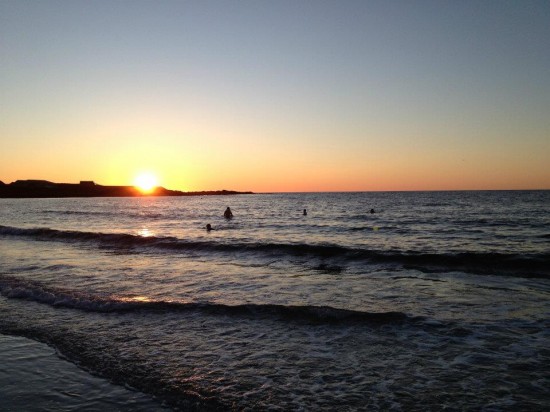
A few months back, we opened an email from Amy Liptrot. She told us a bit about her life, now lived just beyond the edge of the mainland. She’d left London to return home to Orkney, where she’s trying to get the big city out of her system. We wanted to know more. Here, she takes the plunge with the Orkney Polar Bears.
It was in the first weeks of our relationship, when he was still charmed by the spontaneous, drunken aspects of my character that later drove us apart. Late one night we boosted and pulled each other over the ten-foot walls of the inner London lido near where I lived back then – we found scratches and bruises the next day – and dropped silently onto the tiled poolside. The water was luxuriously warm in the cold night and we swam a couple of lengths, under moonlight and CCTV, naked but for balaclavas. I still have have some photos – the flash bright on our pale skin.
At different times I’ve sought the thrill of swimming outdoors, once again now I’m back in Orkney. I’ve joined an eccentric group called the Orkney Polar Bears who every Saturday morning for more than a year have gone swimming in the sea at a different location around the islands.
I prepare by eating porridge and listening to aggressive rap. We make a strange looking group: undressing carside into swimming costumes, wooly hats and goosebumps. Going sea swimming with a group provides the motivation that is lacking alone. Everyone has different techniques for getting into the water – some running enthusiastically, others repeatedly edging up to genital level before backing out.
The swims are a way to experience the changing seasons and different parts of Orkney, location decided following analysis of the tides and wind direction. The nature of islands means that even a relatively small place has miles of coastline – often new to me, unexplored and empty of people. We’ve swam at a bridge beside the main road where we were beeped at by passing lorries, a secluded sandy beach reached by a drive down a long pot-holed track and climbing over fences, rockpools, the harbour.
It’s different than swimming in a chlorinated, right-angled pool. Sometimes curious seals come close and swim with us. Once a swimmer dived under and pulled up a handful of clams that she took home and cooked for lunch. We are swimming over sand, over pebbles, over seaweed and silt; with the birds and fish, in all weathers.
On the first of May, in celebration of May Day or Beltane, we met and swam at dawn – 5:14am – at the most easterly beach on the Orkney mainland, where we could see the sun rise over the ocean horizon. The sea was black and thick when we walked in but the as sun rose, it lit our laughing, yelping faces and caught the ripples on the sea.
It is always gaspingly cold. Over the year, the temperature of the sea surrounding Orkney doesn’t vary much – from an average of a ‘cold’ 13 degrees in August down to an ‘extremely cold’ 7 degrees in February. The first time felt like it was burning my skin but each Saturday it gets slightly easier – your body acclimatises – although I am the wimpiest member of the group, back onshore drying myself while the others are still breaststroking around the pier.
I want to shock myself awake, after central heating and screens, to feel cold, with skin submerged in wild waters, is attractively physical and real. I want to blast away the frustrations of being stuck on this island and no longer have the outlet of getting drunk. The chilly immersion is addictive, verging on unpleasant at the time, but you find yourself craving it – agreeing to go again, planning your next swim; eyeing up lochs, bays or reservoirs.
During each of the first few swims there is a point where my body panics, unbidden I picture drowning and knowing the depth beneath me, my heart rate increases. I need to reach the shore as quickly as possible. When I do pull myself out – up the slipway, climbing the ladder onto the pier, or washing up with the waves onto the beach – I feel saved: reborn and very alive.
People claim all sorts of health benefits to wild swimming – better circulation, improved immunity – with the Outdoor Swimming Society pledging to ’embrace the rejuvenating effects of cold water’ but mainly I do it for the ‘cold water high’ – the exhilaration and endorphins resulting from even a short dip. Afterwards, I go about my Saturday – first stop the supermarket – with a crazy smile and bright red skin that tastes salty. Other Polar Bears report an increase of energy to start the weekend but one member told me she just enjoys that other people think she’s mad. It’s an unconventional hobby and a weekly adventure.
Once after being out all night at a party in an squatted east London warehouse, a friend and I decided – high and wide-eyed – that the thing to do would be a dawn swim in Hampstead Heath ladies ponds. We had grimy rave skin and sleep deprivation and thought the cold water would provide refreshment and even salvation.The sun was coming up and the tube re-opening as we made our way north. Down at the pond we meet a group of elderly women and Nancy tells us that she swims in the outdoor natural pool every morning of the year and that it is her health and her happiness.
Things haven’t changed so much – I used to confuse my neurotransmitters on a Friday night in a hot nightclub, now I shock my senses on a Saturday morning in a freezing sea: plunging warm skin into cold water, forcing a rush of sensation, cleansed.